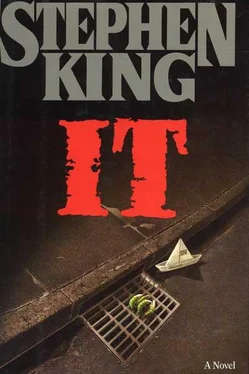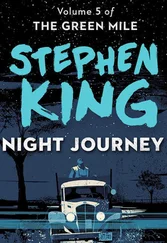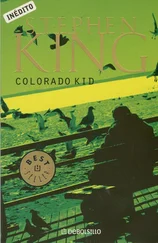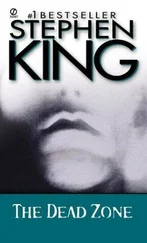Stephen King - It
Здесь есть возможность читать онлайн «Stephen King - It» весь текст электронной книги совершенно бесплатно (целиком полную версию без сокращений). В некоторых случаях можно слушать аудио, скачать через торрент в формате fb2 и присутствует краткое содержание. Год выпуска: 1986, Жанр: Ужасы и Мистика, на английском языке. Описание произведения, (предисловие) а так же отзывы посетителей доступны на портале библиотеки ЛибКат.
- Название:It
- Автор:
- Жанр:
- Год:1986
- ISBN:нет данных
- Рейтинг книги:4.33 / 5. Голосов: 3
-
Избранное:Добавить в избранное
- Отзывы:
-
Ваша оценка:
- 80
- 1
- 2
- 3
- 4
- 5
It: краткое содержание, описание и аннотация
Предлагаем к чтению аннотацию, описание, краткое содержание или предисловие (зависит от того, что написал сам автор книги «It»). Если вы не нашли необходимую информацию о книге — напишите в комментариях, мы постараемся отыскать её.
It — читать онлайн бесплатно полную книгу (весь текст) целиком
Ниже представлен текст книги, разбитый по страницам. Система сохранения места последней прочитанной страницы, позволяет с удобством читать онлайн бесплатно книгу «It», без необходимости каждый раз заново искать на чём Вы остановились. Поставьте закладку, и сможете в любой момент перейти на страницу, на которой закончили чтение.
Интервал:
Закладка:
Very gently, he turned Avery’s face into the pillow again. This time when Avery struggled, Patrick did not let go. He pressed the baby’s face more firmly into the pillow. The baby was making steady muffled cries now, and Patrick knew it was awake. He had a vague idea that it might tell on him to his mother if he stopped. He held it down. The baby struggled. Patrick held it down. The baby farted. Its struggles weakened. Patrick still held it down. It eventually became totally still. Patrick held it down for another five minutes, feeling that excitement crest and then begin to ebb: the shot wearing off, turning the world gray again, the fix mellowing into an accustomed low doze.
Patrick went downstairs and got himself a plate of cookies and poured himself a glass of milk. His mother came down half an hour later and said she hadn’t even heard him come in, she had been that tired (you won’t be anymore, Mom, Patrick thought, don’t worry, I fixed it). She sat down with him, ate one of his cookies, and asked him how school had been. Patrick said it was all right and showed her his drawing of a house and a tree. His paper was covered with looping meaningless scribbles made with black and brown crayon. His mother said it was very nice. Patrick brought home the same looping scrawls of black and brown every day. Sometimes he said it was a turkey, sometimes a Christmas tree, sometimes a boy. His mother always told him it was very nice… although sometimes, in a part of her so deep she hardly knew it was there, she worried. There was something a little disquieting about the dark sameness of those big scribbled loops of black and brown.
She didn’t discover Avery’s death until nearly five o’clock; until then she had simply assumed he was taking a very long nap. By then Patrick was watching Crusader Rabbit on their seven-inch TV, and he went on watching TV through all the uproar that followed. Whirlybirds was on when Mrs Henley arrived from next door (his screaming mother had been holding the baby’s corpse in the open kitchen door, believing in some blind way that the cold air might revive it; Patrick was cold and got a sweater out of the downstairs closet). Highway Patrol, Ben Hanscom’s favorite, was on when Mr Hockstetter arrived home from work. By the time the doctor arrived, Science Fiction Theater, with Your Host Truman Bradley, was just coming on. “Who knows what strange things the universe may hold?” Truman Bradley speculated while Patrick’s mother shrieked and struggled in her husband’s arms in the kitchen. The doctor observed Patrick’s deep calm and unquestioning stare and assumed the boy was in shock. He wanted Patrick to take a pill. Patrick didn’t mind.
It was diagnosed as crib-death. Years later there might have been questions about such a fatality, deviations from the usual infant-death syndrome observed. But when it happened, the death was simply noted and the baby buried. Patrick was gratified that once things finally settled down his meals began to come on time again.
In the madness of that afternoon and evening-people banging in and out of the house, the red lights of the Home Hospital ambulance pulsing on the walls, Mrs Hockstetter screaming and wailing and refusing to be comforted-only Patrick’s father came within brushing distance of the truth. He was standing numbly by Avery’s empty crib some twenty minutes after the body had been removed, simply standing there, unable to believe any of this had happened. He looked down and saw a pair of tracks on the hardwood floor. They had been made by the snow melting off Patrick’s yellow rubber boots. He looked at them, and a dreadful thought rose briefly in his mind like bad gas from a deep mineshaft. His hand went slowly to his mouth and his eyes widened. A picture began to form in his mind. Before it could come clear he left the room, slamming the door behind him so hard that the top of the frame splintered.
He never asked Patrick any questions.
Patrick had never done anything like that again, although he might have done so if the chance had presented itself. He felt no guilt, had no bad dreams. As time passed, however, he became more aware of what would have happened to him if he had been caught. There were rules. Unpleasant things happened to you if you didn’t follow them… or if you were caught breaking them. You could be locked up or stuck in the electrocution chair.
But that remembered feeling of excitement-that feeling of color and sensation-was simply too powerful and too wonderful to give over entirely. Patrick killed flies. At first he only smacked them with his mother’s flyswatter; later he discovered he could kill them quite efficiently with a plastic ruler. He also discovered the joys of flypaper. A long sticky runner of it could be purchased for two cents at the Costello Avenue Market and Patrick sometimes stood for as long as two hours in the garage, watching the flies land and then struggle to get free, his mouth ajar, his dusty eyes alight with that rare excitement, sweat running down his round face and his thick body. Patrick killed beetles, but if possible he captured them first. Sometimes he would steal a long needle from his mother’s pincushion, impale a Japanese beetle on it, and sit cross-legged in the garden watching it die. His expression at these times was the expression of a boy who is reading a very good book. Once he had discovered a run-over cat that was dying in the gutter on Lower Main Street and sat watching it until an old woman saw him pushing the squashed and mewing thing around with his foot. She whacked him with the broom she had been using to sweep her walk. Go on home! she had shouted at him. What are you, crazy? Patrick had gone on home. He wasn’t mad at the old woman. He had been caught breaking the rules, that was all.
Then, last year (it would not have surprised Mike Hanlon or any of the others at that point to have known that it was, in fact, on the same day that George Denbrough had been murdered), Patrick had discovered the rusty Amana refrigerator-one of the larger dumpoids in the belt surrounding the dump itself.
Like Bev, he had heard the cautionary warnings about such abandoned appliances, about how thirty-squirty million kids got their stupid selves smoked in them each year. Patrick had stood looking at the refrigerator for a long time, idly playing pocket-pool with himself. That excitement was back, stronger than it had ever been, except for the time he had fixed Avery. The excitement was back because, in the chilly yet fuming wastes that passed for his mind, Patrick Hockstetter had had an idea.
The Luces, who lived three houses down from the Hockstetters, missed their cat, Bobby, a week later. The Luce kids, who couldn’t remember a time when Bobby hadn’t been there, spent hours combing the neighborhood for him. They even pooled their money and put an ad in the Derry News Lost and Found column. Nothing came of it. And if any of them had seen Patrick that day, bulkier than ever in his mothball-smelling winter parka (after the floodwaters receded in that fall of ’57, it had come off bitterly cold almost at once), carrying a cardboard carton, they would have thought nothing of it.
The Engstroms, a block over and almost directly behind the Hockstetter home, lost their cocker pup about ten days before Thanksgiving. Other families lost dogs and cats over the next six or eight months, and Patrick of course had taken them all, not to mention a dozen unremarked strays from the Hell’s Half-Acre area of Derry.
He put them into the rusty Amana near the dump, one by one. Each time he brought another animal down, his heart thundering in his chest, his eyes hot and watery with excitement, he would expect to find that Mandy Fazio had pulled the Amana’s latch or popped the hinges with his sledgehammer. But Mandy never touched that particular refrigerator. Perhaps he didn’t realize it was there, perhaps the force of Patrick’s will kept him away… or perhaps some other force did that.
Читать дальшеИнтервал:
Закладка:
Похожие книги на «It»
Представляем Вашему вниманию похожие книги на «It» списком для выбора. Мы отобрали схожую по названию и смыслу литературу в надежде предоставить читателям больше вариантов отыскать новые, интересные, ещё непрочитанные произведения.
Обсуждение, отзывы о книге «It» и просто собственные мнения читателей. Оставьте ваши комментарии, напишите, что Вы думаете о произведении, его смысле или главных героях. Укажите что конкретно понравилось, а что нет, и почему Вы так считаете.











